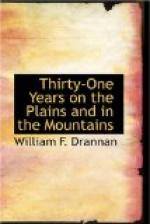The second day out we climbed to the top of a high ridge, and by looking through the glass we could see a large emigrant train coming, which we thought to be about twenty miles distant. We knew very well where it would camp, and by riding briskly we would be able to meet it by dark; so we rode on and reached the emigrants about sunset. They were just corralling their wagons for the night, and when they saw us coming they took us for Indians and every man went for his gun. As soon as we saw them start for their guns we both took off our hats and waved them over our heads, when they saw that they were needlessly alarmed. This train was from Texas, and the name of the captain was Sours, and it was beyond doubt the best organized train I ever saw on the plains; everything seemed to move like clock work.
When I told Capt. Sours who we were and what our business was and that as soon as they got to our quarters they would have an escort, he said: “I am indeed very glad to know that there is some protection out here for emigrants, but as for ourselves we do not need it much, for every man in my train has seven shots, and some of them three times that number.”
We stayed with them that night and the next morning pulled out for our quarters. We remained there for a month, but did not see any Indians during that time.
At the end of the month there came along a large train from Arkansas and Texas. We escorted it across the mountains expecting that this would wind up the emigrant travel across there for the season. When we arrived at Lieut. Jackson’s quarters he started George and I and two other scouts out towards the Salt river valley settlement, telling me that he would move down near Mrs. Davis’ ranch and there he would wait until he should hear from me. The third day out we made camp early on account of water, and after deciding on the spot where we should pitch our camp for the night George rode off to a high ridge near by to take a look over the country. He was not gone long before he made his appearance riding at full speed, and announced that there was a large band of Indians coming direct for our camp, and would be on to us before we could saddle up and get away.
“Get your horses boys,” were his first words, and every man made a rush for his horse, but before we could get saddled the Indians hove in sight, and not over half a mile away.
“There they are,” said George as he jumped on to his horse again, “and there must be at least sixty of them.”
I was not long in making up my mind what to do. We all got our horses saddled and were mounted just in the nick of time to get away for we were not twenty yards from camp when they were close on to us.




